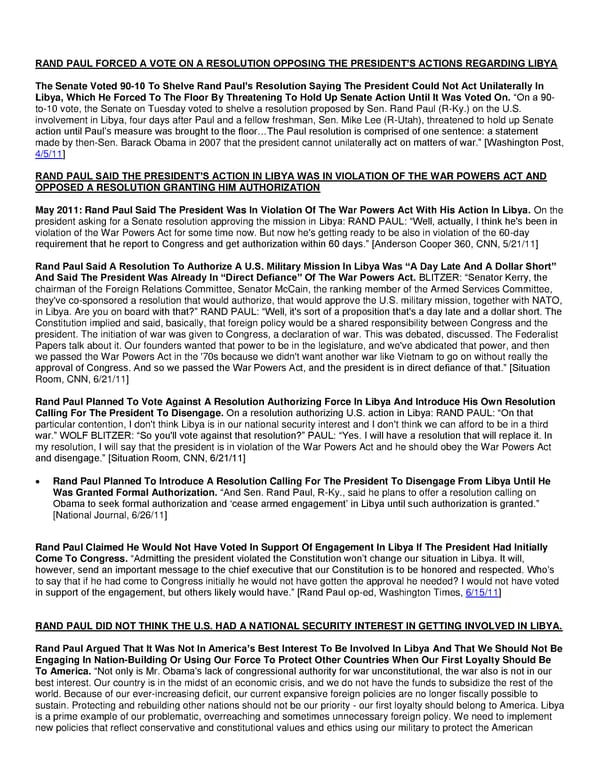RAND PAUL FORCED A VOTE ON A RESOLUTION OPPOSING THE PRESIDENT’S ACTIONS REGARDING LIBYA The Senate Voted 90-10 To Shelve Rand Paul’s Resolution Saying The President Could Not Act Unilaterally In Libya, Which He Forced To The Floor By Threatening To Hold Up Senate Action Until It Was Voted On. “On a 90- to-10 vote, the Senate on Tuesday voted to shelve a resolution proposed by Sen. Rand Paul (R-Ky.) on the U.S. involvement in Libya, four days after Paul and a fellow freshman, Sen. Mike Lee (R-Utah), threatened to hold up Senate action until Paul’s measure was brought to the floor…The Paul resolution is comprised of one sentence: a statement made by then-Sen. Barack Obama in 2007 that the president cannot unilaterally act on matters of war.” [Washington Post, 4/5/11] RAND PAUL SAID THE PRESIDENT’S ACTION IN LIBYA WAS IN VIOLATION OF THE WAR POWERS ACT AND OPPOSED A RESOLUTION GRANTING HIM AUTHORIZATION May 2011: Rand Paul Said The President Was In Violation Of The War Powers Act With His Action In Libya. On the president asking for a Senate resolution approving the mission in Libya: RAND PAUL: “Well, actually, I think he's been in violation of the War Powers Act for some time now. But now he's getting ready to be also in violation of the 60-day requirement that he report to Congress and get authorization within 60 days.” [Anderson Cooper 360, CNN, 5/21/11] Rand Paul Said A Resolution To Authorize A U.S. Military Mission In Libya Was “A Day Late And A Dollar Short” And Said The President Was Already In “Direct Defiance” Of The War Powers Act. BLITZER: “Senator Kerry, the chairman of the Foreign Relations Committee, Senator McCain, the ranking member of the Armed Services Committee, they've co-sponsored a resolution that would authorize, that would approve the U.S. military mission, together with NATO, in Libya. Are you on board with that?” RAND PAUL: “Well, it's sort of a proposition that's a day late and a dollar short. The Constitution implied and said, basically, that foreign policy would be a shared responsibility between Congress and the president. The initiation of war was given to Congress, a declaration of war. This was debated, discussed. The Federalist Papers talk about it. Our founders wanted that power to be in the legislature, and we've abdicated that power, and then we passed the War Powers Act in the '70s because we didn't want another war like Vietnam to go on without really the approval of Congress. And so we passed the War Powers Act, and the president is in direct defiance of that.” [Situation Room, CNN, 6/21/11] Rand Paul Planned To Vote Against A Resolution Authorizing Force In Libya And Introduce His Own Resolution Calling For The President To Disengage. On a resolution authorizing U.S. action in Libya: RAND PAUL: “On that particular contention, I don't think Libya is in our national security interest and I don't think we can afford to be in a third war.” WOLF BLITZER: “So you'll vote against that resolution?” PAUL: “Yes. I will have a resolution that will replace it. In my resolution, I will say that the president is in violation of the War Powers Act and he should obey the War Powers Act and disengage.” [Situation Room, CNN, 6/21/11] Rand Paul Planned To Introduce A Resolution Calling For The President To Disengage From Libya Until He Was Granted Formal Authorization. “And Sen. Rand Paul, R-Ky., said he plans to offer a resolution calling on Obama to seek formal authorization and ‘cease armed engagement’ in Libya until such authorization is granted.” [National Journal, 6/26/11] Rand Paul Claimed He Would Not Have Voted In Support Of Engagement In Libya If The President Had Initially Come To Congress. “Admitting the president violated the Constitution won’t change our situation in Libya. It will, however, send an important message to the chief executive that our Constitution is to be honored and respected. Who’s to say that if he had come to Congress initially he would not have gotten the approval he needed? I would not have voted in support of the engagement, but others likely would have.” [Rand Paul op-ed, Washington Times, 6/15/11] RAND PAUL DID NOT THINK THE U.S. HAD A NATIONAL SECURITY INTEREST IN GETTING INVOLVED IN LIBYA. Rand Paul Argued That It Was Not In America’s Best Interest To Be Involved In Libya And That We Should Not Be Engaging In Nation-Building Or Using Our Force To Protect Other Countries When Our First Loyalty Should Be To America. “Not only is Mr. Obama’s lack of congressional authority for war unconstitutional, the war also is not in our best interest. Our country is in the midst of an economic crisis, and we do not have the funds to subsidize the rest of the world. Because of our ever-increasing deficit, our current expansive foreign policies are no longer fiscally possible to sustain. Protecting and rebuilding other nations should not be our priority - our first loyalty should belong to America. Libya is a prime example of our problematic, overreaching and sometimes unnecessary foreign policy. We need to implement new policies that reflect conservative and constitutional values and ethics using our military to protect the American
 2016ers on 2011 Libyan Civil War Page 3 Page 5
2016ers on 2011 Libyan Civil War Page 3 Page 5